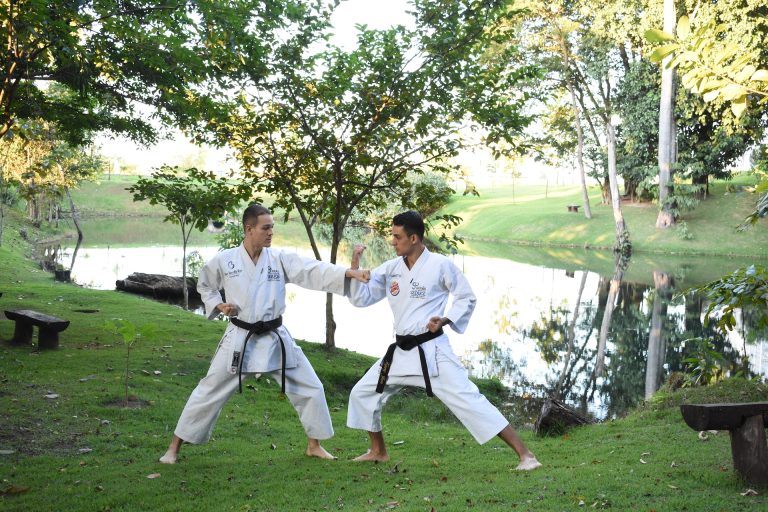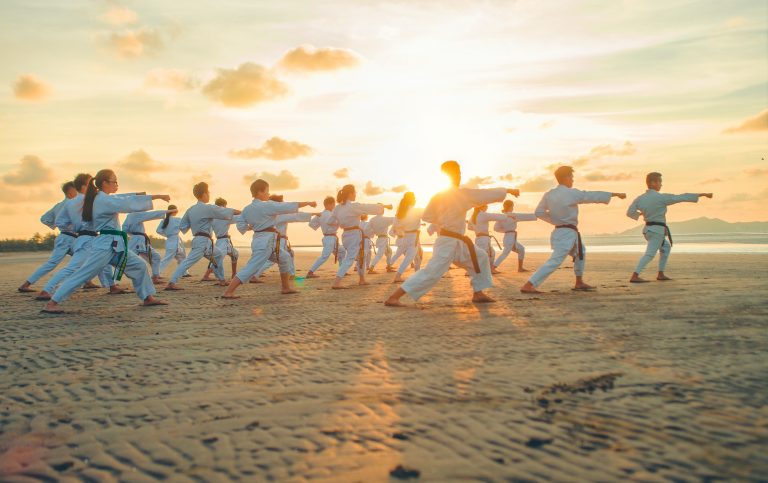Karate-Do: An introduction to the philosophy of martial arts
Karate-Do is a Japanese martial art that is not only focused on physical techniques but is also infused with a rich philosophical background. In Karate, the practice is not just about mastering self-defense techniques, it is also about cultivating the practitioner’s character and mindset. In this blog post, we will delve into the philosophical foundations of Karate-Do and what makes it a unique form of martial arts.
The Origins of Karate-Do
Karate-Do originated in the Ryukyu Islands, now known as Okinawa, in Japan. Because of its location, Okinawa was influenced by both Chinese and Japanese cultures. Its people originally developed unarmed combat techniques as they were forbidden to carry weapons during the time the island was under Japanese control. These techniques eventually evolved into Karate-Do, which means “the way of the empty hand.”
The Significance of Kata
In Karate-Do, practitioners perform Kata, which are choreographed sequences of movements that simulate various combat situations. Kata is essential in Karate-Do as it teaches the practitioner the proper way to move, control their breathing, and maintain their focus. Kata is also a form of physical and mental training, as it helps the practitioner develop their muscle memory and concentration.
The Philosophy of Karate-Do
Karate-Do has a set of principles that govern its practice. These include respect, perseverance, and self-discipline. One of the key philosophies of Karate-Do is to use only the necessary force to defend oneself. This means that practice and training should not be centered on using violent or excessive force. Instead, the focus is on mastering techniques and developing a strong character.
Another essential philosophy of Karate-Do is the concept of “mushin,” which translates to “no-mind.” This state is achieved when the practitioner is completely present and focused without being distracted by external influences. The goal of practicing Karate-Do is to reach a state of mushin during training and in everyday life.
The Benefits of Practicing Karate-Do
Practicing Karate-Do has numerous benefits, both for physical and mental health. It helps improve flexibility, balance, and coordination through the execution of various techniques. The practice also promotes a sense of well-being and stress relief, as it requires the practitioner to be present and in the moment. Karate-Do emphasizes self-discipline, patience, and humility, which can also translate into other areas of life outside the dojo.
Conclusion
Karate-Do is more than just physical training; it is a way to develop a strong character and mindset. Its philosophy emphasizes using only the necessary force, achieving a state of no-mind, and living a life based on principles of respect, perseverance, and self-discipline. By practicing Karate-Do, one can improve both their physical and mental well-being and develop a stronger and more resilient character.
The Philosophy Behind Karate-Do: An Introduction to Martial Arts
Karate-Do is a traditional martial art form that originated in Okinawa, Japan, and has now become popular all over the world. It is considered as a physical and mental discipline that combines self-defense techniques with spiritual and philosophical teachings.
In this article, we will be discussing some of the commonly asked questions about Karate-Do and its philosophy. So, let’s get started!
What is the Meaning of Karate-Do?
The term Karate-Do is derived from two Japanese words: „Karate“ and „Do.“ „Karate“ means ‚empty hand‘ and „Do“ means ‚the way of life.‘ So, when combined together, Karate-Do means the „way of life with empty hands.“ It is a way of self-improvement and self-discipline that integrates physical and mental training.
What is the Philosophy Behind Karate-Do?
The philosophy behind Karate-Do is heavily influenced by Zen Buddhism, Confucianism, and Shintoism. It focuses on building the character of the practitioner by emphasizing values such as humility, perseverance, respect, self-control, and harmony with nature. It is not just a physical exercise but a journey towards self-awareness and self-improvement.
Karate-Do emphasizes on the development of one’s character and the pursuit of spiritual enlightenment. In addition to self-defense techniques, it teaches its practitioners about the importance of living in harmony with others, respecting the environment around them, and becoming a contributing member of society.
What are the Benefits of Practicing Karate-Do?
Karate-Do is not just a means of self-defense; it has numerous benefits that can help an individual in their daily life. Here are some of the benefits of practicing Karate-Do:
Physical Benefits
– Strengthens the body and improves overall physical health.
– Increases flexibility, coordination, and balance.
– Enhances cardiovascular health and endurance.
Mental Benefits
– Boosts self-confidence and self-esteem.
– Enhances focus, concentration, and mental clarity.
– Teaches stress management and promotes a positive attitude towards life.
Social Benefits
– Builds strong relationships with like-minded individuals.
– Enhances communication skills and teaches conflict resolution.
– Encourages community involvement and social responsibility.
What are the Different Styles of Karate?
There are various styles of Karate-Do, each with its unique techniques and philosophies. Some of the most commonly practiced styles of Karate are:
– Shotokan Karate
– Goju-Ryu Karate
– Shito-Ryu Karate
– Wado-Ryu Karate
– Kyokushin Karate
What Does a Typical Karate-Do Class Involve?
A typical Karate-Do class involves a combination of physical training and mental development. It usually starts with a warm-up exercise, followed by basic techniques such as punches, kicks, and blocks. This is then followed by the practice of Kata, which involves performing a set pattern of movements in a particular sequence.
Kumite, which is sparring with a partner, is also an integral component of Karate-Do training. In addition to physical training, Karate-Do also involves the study of philosophy, morals, and ethics.
Can Anyone Practice Karate-Do?
Karate-Do can be practiced by anyone, regardless of age, gender, or physical ability. Children, adults, and seniors can all benefit from the training and philosophy of Karate-Do. It is a versatile practice that can be adapted to the needs of the individual.
How Long Does It Take to Master Karate-Do?
Karate-Do is a lifelong journey, and mastery is never truly achieved. It takes years of consistent practice, dedication, and perseverance to become proficient in Karate-Do. However, the journey itself is rewarding, and the benefits of training can be felt from the very beginning.
Conclusion
Karate-Do is not just a physical exercise but a journey towards self-awareness and self-improvement. It teaches its practitioners about the importance of living in harmony with others, respecting the environment around them, and becoming a contributing member of society.
Whether you are looking for physical fitness, mental clarity or spiritual growth, Karate-Do can help you achieve your goals. It is a versatile practice that can be adapted to the needs and abilities of the individual. So, if you are interested in embarking on a journey towards self-improvement, Karate-Do may just be the practice for you!
Inhaltsverzeichnis






